
More Helpful Content
With the boom in online shopping and changing consumer behavior, businesses are increasingly adopting D2C fulfillment. This approach offers numerous advantages over traditional retail, such as boosting profits, quality control, enhanced customer experience and granting more opportunities for smaller businesses.
We will give you a closer look at D2C fulfillment, along with the benefits and strategies of utilizing this model to get ready to jump into this transformative trend.
D2C (Direct-to-Consumer) fulfillment, sometimes known as e-commerce fulfillment or DTC fulfillment, is a business model where companies directly sell their products to consumers through digital channels or online platforms.
There is no middleman such as retail stores, wholesalers or distributors in D2C fulfillment. The companies handle the full supply chain process, from product sourcing or manufacture to direct order fulfillment and shipping to the end consumer.
>> Learn more:
In a nutshell, D2C fulfillment starts when a customer orders online. The order goes to the warehouse, where items are picked, packed, and shipped to the customer. Everything happens directly, from the fulfillment center to the customer.
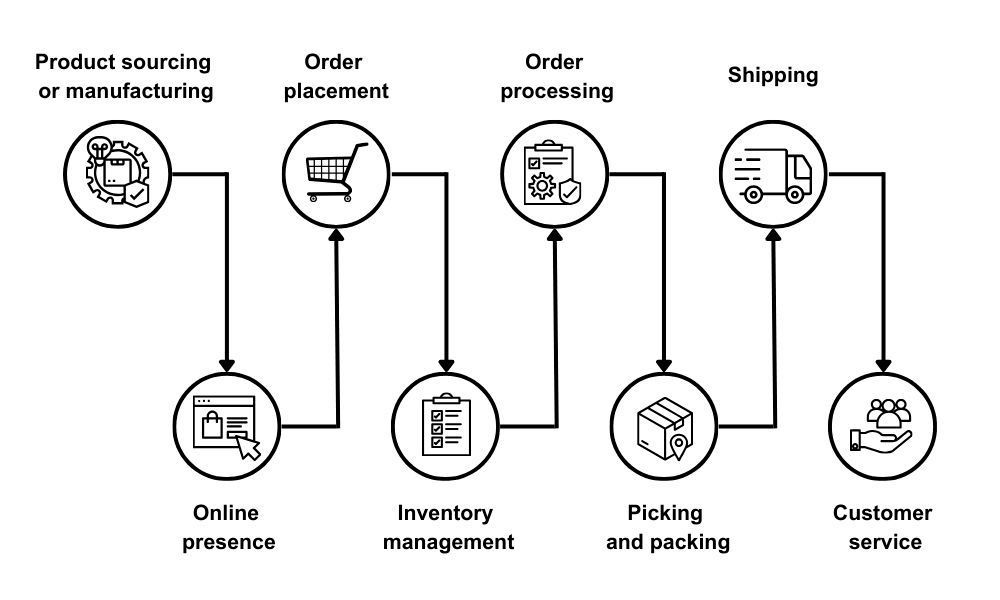
In detail, here is how D2C fulfillment works:
This streamlined process of D2C fulfillment ensures efficient order processing, timely delivery, and direct interaction with customers for a more personalized experience.
A wonder may arise at first: “What is the difference between D2C and B2C (business-to-consumer)?”
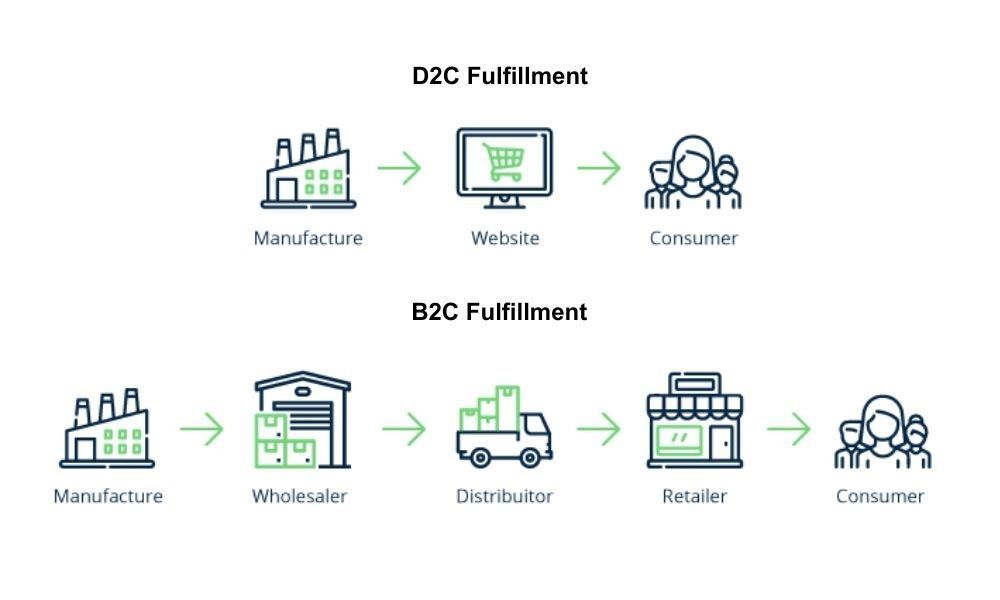
All D2C activities are a part of B2C, but not all B2C companies are automatically D2C.
To understand better, Imagine: If a company sells items directly to end consumers, whether or not there are intermediaries such as marketplaces and online platforms like Amazon or eBay, it is B2C. If they do it directly without intermediaries, then it's D2C as we defined above.
The key difference lies in that D2C businesses sell products or services they manufacture directly to end consumers, bypassing intermediaries. This involves selling through their self-owned channels or retail spaces, eliminating the need for reliance on third-party involvement.
Embarking on the D2C fulfillment journey in e-commerce isn't just a strategy; it's a game-changer! D2C strategy offers many advantages for businesses looking to streamline their operations and enhance the customer experience.
Let's discover the magic of D2C fulfillment where innovation, profitability, and customer satisfaction converge to redefine the e-commerce landscape.
The first good side to look at: D2C strategies prove to be more cost-effective compared to traditional retail strategies.
Traditional retail involves a chain of manufacturers, wholesalers, distributors, warehouses, and retail stores, incurring substantial costs that influence pricing.
In contrast, D2C eliminates retail intermediaries, allowing businesses to cut expenses related to warehousing, shipping, and marketing. This means lower prices for customers, making it a win for budget-conscious shoppers.
Getting refunds, exchanges, or repairs becomes simpler when dealing directly with the company that manufactures the product. Successful D2C brands are praised for their customer-focused policies, going above and beyond to ensure customer satisfaction.
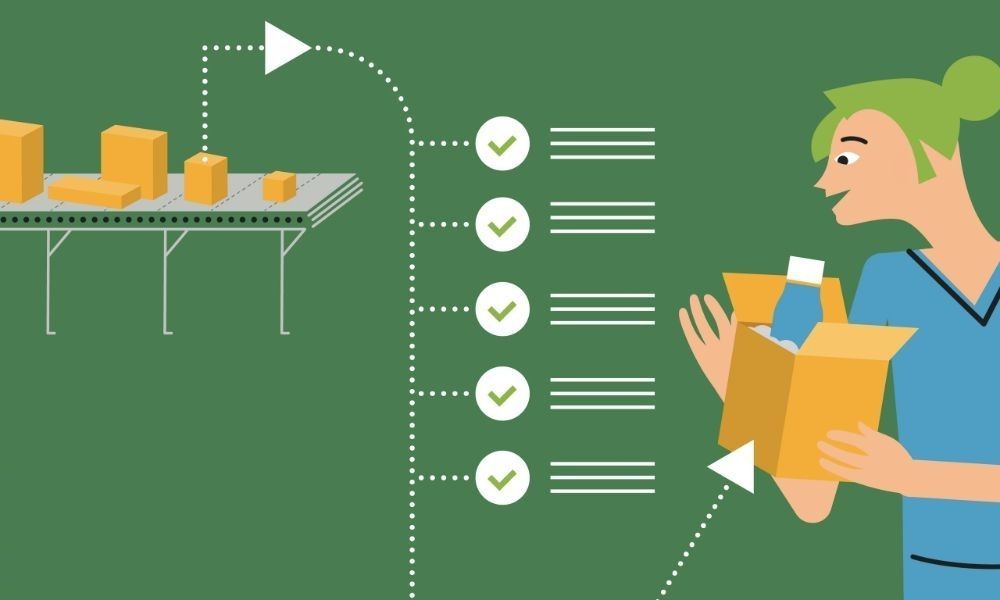
Additionally, D2C strategies provide businesses with heightened control over the supply chain, allowing for the implementation of policies that better match customer expectations and current industry trends.
Keeping a close eye on the D2C fulfillment process enables businesses to maintain strict quality control standards. This ensures that products meet the expected quality and that customers receive reliable and consistent experiences.
Plus, because businesses directly interact with customers and get quick feedback, they can promptly address any issues. This all works together to maintain and even improve the quality of products in the D2C model.
D2C brands build community engagement by talking directly with customers through online platforms, being open about their story, and valuing customer feedback. They create exclusive groups, encourage users to share their experiences, and involve customers in shaping the brand.
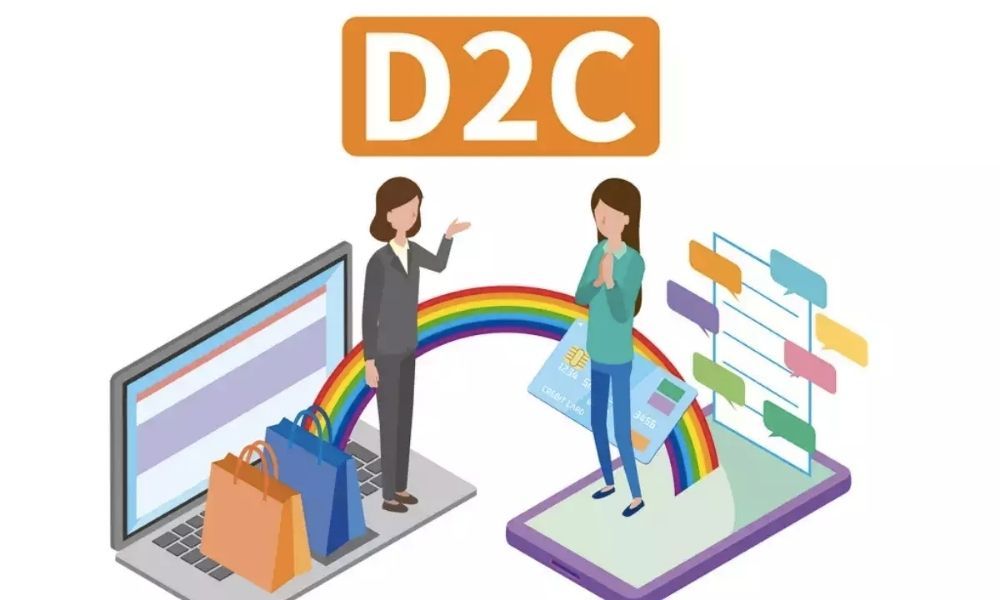
By aligning with shared values and causes, personalizing experiences, and hosting events, D2C brands make customers feel connected and part of a larger community.
Moreover, many D2C brands also do good things. They build their brand around certain values and support charitable causes, which helps them not only align them with customers who share similar values but also establish a deeper, more personal connection.
Getting into the D2C game is simpler than ever. Thanks to user-friendly e-commerce platforms such as Shopify, WooCommerce, BigCommerce, and others, launching a new business is a breeze. Just sign up, and your business is all set to begin receiving orders.
The lower barriers to entry mean that aspiring entrepreneurs can easily step into the D2C space while removing all complexities that were once associated with starting a business. These lower entry barriers open up opportunities for more individuals to bring their ideas to market and establish their own D2C brands.
Implementing effective D2C fulfillment strategies is crucial for the success of a business. Let's take a look at some outstanding strategies for D2C fulfillment E-commerce!
In-house fulfillment means a business takes charge of its own warehouse and fulfillment tasks instead of relying on a third-party logistics (3PL) company. This approach grants businesses with a higher degree of control over the entire fulfillment process and the customer experience, offering the potential for cost savings.
However, setting up in-house fulfillment requires significant investments in warehouse facilities, advanced inventory management systems, and shipping infrastructure, which can be financially demanding.
Additionally, the company must undertake the recruitment and training of a specialized team responsible for tasks such as order picking and packing, inventory control, and shipping coordination.
There is a trade-off, of course! While in-house fulfillment demands a substantial upfront investment, it offers businesses the advantage of direct oversight and customization in their fulfillment processes.
Outsourcing fulfillment involves contracting a third-party logistics provider (3PL) to manage various aspects of a company's D2C order fulfillment process, including warehousing, inventory, and shipping operations.
Instead of managing these tasks in-house, the company relies on the expertise and infrastructure of the 3PL to efficiently and cost-effectively handle the logistics of storing products and delivering them to customers.
A notable example of this strategy is Fulfillment by Amazon (FBA). If your brand is deeply entrenched in the Amazon Marketplace, FBA makes a lot of sense.
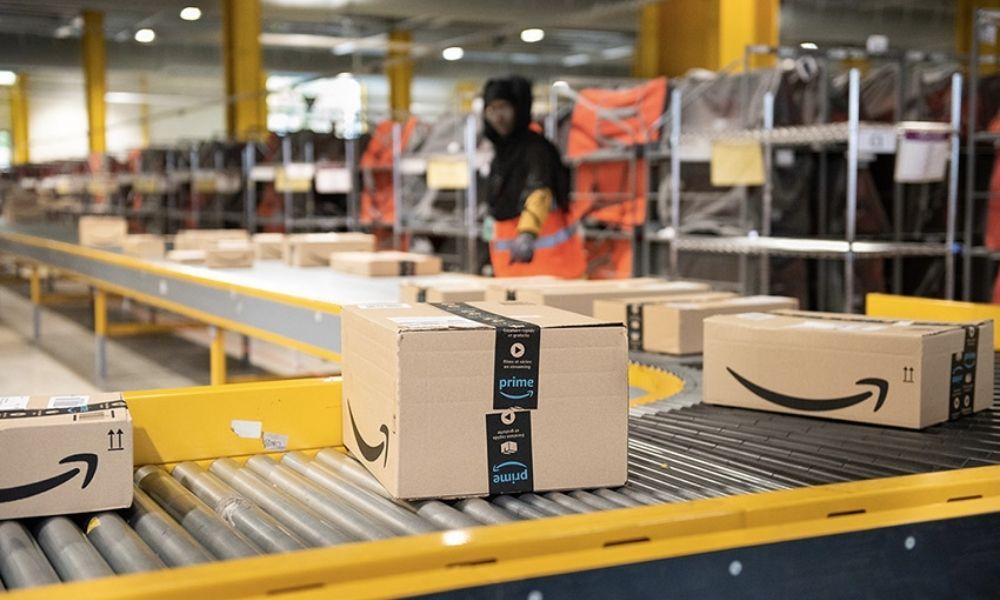
Using FBA lets you offer Prime shipping, making it more likely that customers will choose your product for its speedy delivery through Amazon.
Indeed, the benefits of outsourcing fulfillment include leveraging the expertise and infrastructure of the 3PL, reducing fixed costs, and allowing companies to focus on core competencies.
Nevertheless, this comes with a potential drawback as it may lead to a reduction in flexibility and control over the fulfillment process, which could impact the overall customer experience.
Back to the above-mentioned example, Amazon's holiday season limits on warehouse space can limit your sales and miss out on a great chance for D2C businesses to build their brand and earn big money.
Hybrid fulfillment is a strategy that mixes both in-house and outsourced approaches. In this approach, a company manages certain aspects of its order fulfillment process internally while outsourcing other tasks to third-party logistics providers (3PLs).
The benefits of hybrid fulfillment include increased flexibility, cost-effectiveness, and the ability to leverage external expertise. By handling some operations in-house, companies retain control over key aspects of the fulfillment process.
However, there are challenges, like dealing with the complexity of both approaches, potential coordination issues, and the need for careful system integration.
Hybrid fulfillment is often adopted to strike a balance between control and efficiency, tailored to the specific needs and resources of a business.
Partnering with EFEX for Direct to Consumer services is a seamless and efficient way to enhance your business operations and unlock the full potential of your business.
Our service not only ensures hassle-free fulfillment, covering everything from storage to order handling and shipping, but it also allows you to save big bucks on operational costs. With potential savings of up to 70%, you only pay for what you use, freeing up resources for business growth.
With a robust infrastructure and advanced technology, EFEX offers a comprehensive solution that allows you to focus on growing your business while we take care of the logistics.
You will experience the benefits of our direct to consumer distribution service with faster delivery times. Our commitment to service-level agreements guarantees precise order handling, reaching an accuracy rate of 99.9%.
Whether you're a small startup or an established brand, our D2C e-commerce order fulfillment service is designed to optimize your supply chain, ensure your orders are handled efficiently, boost sales and enhance your brand reputation.
D2C fulfillment is revolutionizing the dynamic landscape of e-commerce. It gives game-changing opportunities for both well-established brands and startups with its accessible entry and diverse strategies.
As the significance of order fulfillment and logistics intensifies, collaborating with EFEX becomes a smart move for businesses aiming to succeed.
We streamline business operations, facilitate efficient workflows, and ensure a positive customer experience by prioritizing fast delivery. Don't hesitate to get in touch with us today to discover more about our services!


